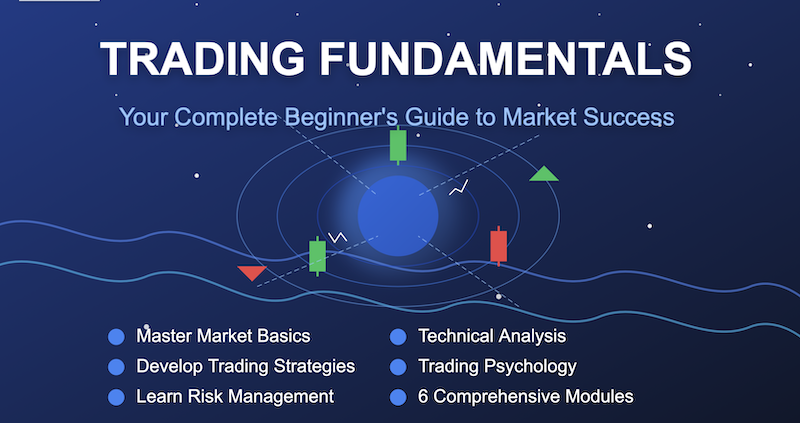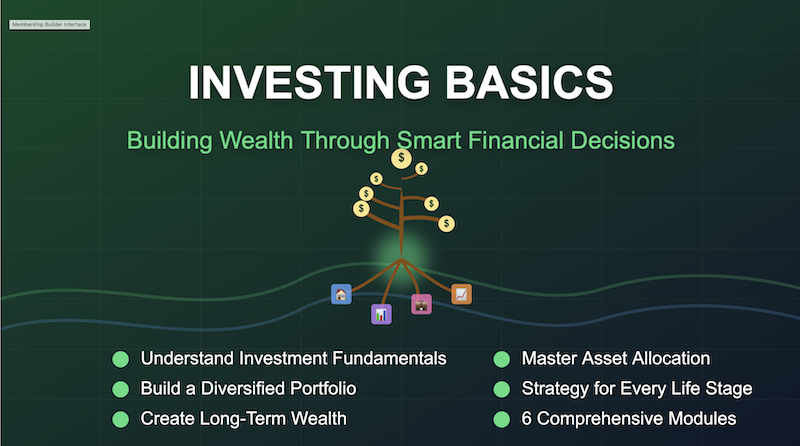The Psychology Behind Profitable Trading: Why 90% of Traders Fail and How to Join the Winning 10%
14 min read
Published: June 10, 2025, 11:02 a.m. ET
Key Points
⚡Behavioral biases, not lack of market knowledge, represent the primary obstacle to trading success
⚡ Successful traders demonstrate measurable differences in emotional regulation and decision-making processes
⚡ Loss aversion and overconfidence create systematic patterns of poor risk management among failing traders
⚡ The profitable minority employs specific psychological frameworks that can be learned and developed
The Neuroscience of Trading Decisions
Recent neuroimaging studies conducted at major universities have revealed fascinating insights into how trader brains function under market stress. Dr. Andrew Lo's research at MIT demonstrates that successful traders exhibit different neural activation patterns when processing potential losses compared to unsuccessful traders.
The amygdala, responsible for fear responses, shows significantly less activation in profitable traders when facing drawdowns, while areas associated with analytical thinking remain more active.This neurological evidence supports what market practitioners have long observed: successful trading requires emotional regulation that goes beyond simple discipline.
The brain's reward system, evolved for survival in prehistoric environments, proves poorly adapted to the abstract risks and rewards of financial markets. Understanding these biological predispositions represents the first step toward overcoming them.Brain imaging studies reveal that losing money activates the same neural regions as physical pain, explaining why traders often make irrational decisions to avoid realizing losses.
This "loss aversion" bias, first documented by behavioral economists Daniel Kahneman and Amos Tversky, manifests in trading through the tendency to hold losing positions too long while cutting winning positions too early.
AvaTrade offers professionally designed model portfolios
Statistical Reality: The 90% Failure Rate
Multiple independent studies confirm the harsh mathematics of retail trading success. The Securities and Exchange Commission's analysis of day trading firms between 2000-2004 found that 80% of day traders lost money over a 12-month period.
More recent data from major retail brokerages suggests this figure may actually understate the failure rate when measured over longer timeframes.A comprehensive study by the Taiwan Stock Exchange, analyzing over 360,000 individual trading accounts, found that less than 1% of day traders consistently earned profits after accounting for transaction costs over a five-year period. Similar patterns emerge across different markets: forex trading statistics from major brokers indicate that 70-85% of retail traders lose money quarterly.
These statistics remain consistent regardless of market conditions, suggesting that bull or bear markets do not fundamentally alter the psychological challenges that separate successful from unsuccessful traders. The failure rate appears largely independent of external factors, pointing to internal, psychological determinants of success.
WATCH LIST
Ready to put time on your side? With AvaTrade's instant account setup, you can begin investing in top companies like Apple, Microsoft, and Google in minutes.
Loss Aversion and Its Trading Implications
Loss aversion, the tendency to feel losses approximately twice as intensely as equivalent gains, creates systematic distortions in trading behavior. This asymmetry in emotional response leads to the disposition effect, where traders hold losing positions in hope of recovery while quickly selling winning positions to lock in gains.
Mathematical analysis reveals the destructive nature of this behavior. Consider a trader who cuts winning trades at 5% gains while allowing losing trades to reach 10% losses. Even with a 60% win rate, this approach guarantees long-term losses: (0.6 × 5%) + (0.4 × -10%) = 3% - 4% = -1% expected return per trade.
Professional traders combat loss aversion through predetermined exit strategies that remove emotional decision-making from loss realization. They establish stop-loss levels before entering positions and adhere to these levels regardless of subsequent emotional impulses.
This systematic approach transforms loss-taking from an emotional decision into a mechanical process.
AvaTrade offers professionally designed model portfolios that include optimal allocations to tech leaders like Apple, Microsoft, and Google, balanced with other sectors.
AvaTrade offers professionally designed model portfolios that include optimal allocations to tech leaders like Apple, Microsoft, and Google, balanced with other sectors.
Confirmation Bias in Market Analysis
Confirmation bias leads traders to seek information that supports their existing positions while ignoring contradictory evidence. This selective information processing can be particularly dangerous in trending markets where initial success reinforces false confidence in one's analytical abilities.
Social media algorithms exacerbate confirmation bias by creating echo chambers where traders primarily encounter information that aligns with their existing beliefs. A trader bullish on technology stocks will increasingly see content supporting that view, while bearish perspectives gradually disappear from their feeds.
Successful traders actively combat confirmation bias by seeking diverse perspectives and deliberately exposing themselves to contradictory viewpoints. They maintain decision journals that document their reasoning at the time of trade entry, allowing for objective post-trade analysis that isn't colored by subsequent market movements.
The Anatomy of Successful Trading Psychology
Research into consistently profitable traders reveals several distinguishing psychological characteristics. These traders demonstrate superior emotional regulation, maintaining consistent decision-making processes regardless of recent gains or losses. They exhibit what psychologists term "affect-neutral" decision making, where emotional states don't significantly influence their trading choices.
Successful traders also display more accurate self-assessment abilities. They maintain detailed records of their performance and honestly evaluate their strengths and weaknesses. This metacognitive awareness allows them to continuously refine their approaches and avoid repeating past mistakes.
Perhaps most importantly, profitable traders demonstrate patience and selectivity. While unsuccessful traders often feel compelled to be constantly active in markets, successful traders wait for high-probability opportunities that align with their established criteria. This patience requires tremendous psychological discipline, as it means accepting periods of inactivity while markets move without their participation.
Risk Management as Psychological Framework
Effective risk management transcends technical position sizing calculations to encompass a comprehensive psychological framework for handling uncertainty.
Successful traders view risk management not as a constraint on profits but as the foundation that enables long-term survival and growth.
The psychological aspect of risk management begins with accepting that losses are inevitable and viewing them as a cost of doing business rather than personal failures.
This mindset shift allows traders to take appropriate risks without the emotional baggage that clouds judgment when positions move against them.Position sizing psychology plays a crucial role in long-term success.
Traders who risk too much per trade subject themselves to emotional stress that impairs decision-making abilities. Conversely, those who risk too little may struggle with the patience required for their strategies to compound over time.
Finding the optimal balance requires honest self-assessment of one's emotional tolerance for different levels of financial risk.
The Path to the Successful 10%
Joining the minority of successful traders requires a fundamental shift from focusing on market prediction to focusing on personal psychology and risk management.
This transition typically involves several stages: initial awareness of psychological factors, systematic study of one's own behavioral patterns, implementation of specific techniques for bias mitigation, and ongoing refinement of psychological skills.
The timeline for developing successful trading psychology varies significantly among individuals, but research suggests that consistent profitability typically requires 2-5 years of dedicated practice for most traders.
This timeline reflects the complexity of changing deep-seated behavioral patterns and developing the emotional regulation skills necessary for consistent success.
Most importantly, aspiring successful traders must view psychological development as an ongoing process rather than a destination. Markets evolve, personal circumstances change, and new psychological challenges emerge throughout a trader's career.
Continuous learning and adaptation remain essential for maintaining long-term success.
Ready to put time on your side? With AvaTrade's instant account setup, you can begin investing in top companies like Apple, Microsoft, and Google in minutes.
Practical Implementation Strategies
Developing successful trading psychology requires concrete, actionable steps rather than abstract concepts. Successful traders typically begin by establishing a comprehensive trading plan that includes specific entry and exit criteria, position sizing rules, and risk management parameters.
This plan serves as an emotional anchor during periods of market stress.
Maintaining a detailed trading journal represents another crucial element of psychological development. This journal should document not only trade details but also emotional states, decision-making processes, and lessons learned. Regular review of this journal helps identify recurring patterns and areas for improvement.
Creating a supportive environment for trading success often involves limiting exposure to sources of emotional volatility. This might include avoiding financial news during trading hours, unfollowing social media accounts that promote unrealistic expectations, and establishing clear boundaries between trading activities and other life responsibilities.
Bottom Line
The 90% failure rate among traders reflects fundamental psychological challenges rather than lack of market knowledge or technical skills.
Success requires developing emotional regulation, overcoming cognitive biases, and implementing systematic approaches to risk management.
While the psychological barriers to trading success are significant, they can be overcome through dedicated practice, honest self-assessment, and continuous learning.
The information provided is for educational purposes only and does not constitute investment advice, trading advice, or financial recommendations. Trading involves significant risk. Past performance is not indicative of future results. Please consult a licensed financial advisor before making any investment decisions
COURSES FOR BEGINNERS

Trading Fundamentals: Complete Beginner's Guide to Market Success

Investing Basics: Through Smart Financial Decisions

Crypto Fundamentals: Understanding Digital Assets

Complete Beginner's Guide for Bonds - Sprint Course
COURSES FOR ADVANCED

Advanced Investing Tactics

Specialized Stock Sectors

Crypto Beyond Basics - Advanced Course

ETF Mastery - Sprint Course
Ready to put time on your side? With AvaTrade's instant account setup, you can begin investing in top companies like Apple, Microsoft, and Google in minutes.

Company Information:
Polonix Academy is owned and operated by Polonix LTD. All content, services, and features offered through this platform are governed by the terms and conditions set forth by Polonix LTD
Risk Disclosure & Disclaimer:
The content on polonixacademy.com is for informational and educational purposes only and should not be construed as professional financial advice. Should you need such advice, consult a licensed financial or tax advisor. References to products, offers, and rates from third party sites often change. While we do our best to keep these updated, numbers stated on this site may differ from actual numbers. We may have financial relationships with some of the companies mentioned on this website. Among other things, we may receive free products, services, and/or monetary compensation in exchange for featured placement of sponsored products or services. We strive to write accurate and genuine reviews and articles, and all views and opinions expressed are solely those of the authors.
If you have a complaint, you can contact [email protected] Complaints related to comparison journeys will be forwarded to the relevant service provider, while article-specific complaints will be addressed directly by the editorial team.
Polonix Academy © Copyright 2025. All Rights Reserved.





